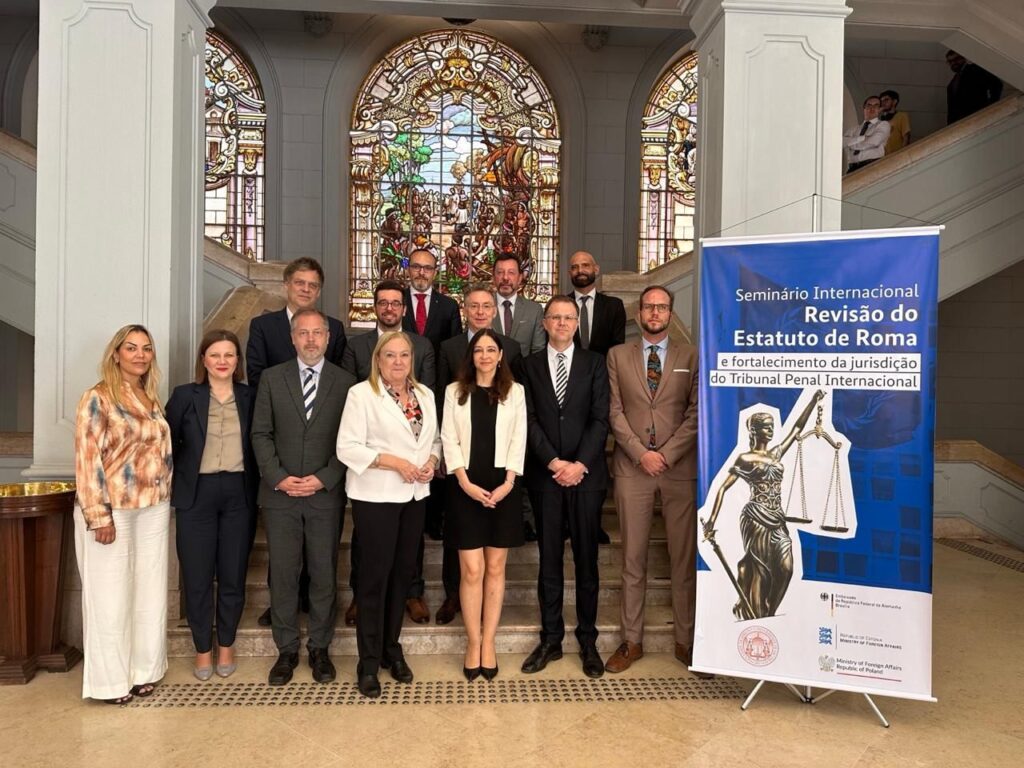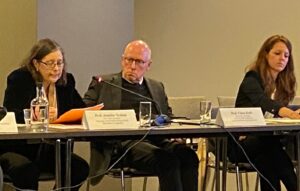

Our purpose: Promoting peace through criminal justice – preventing crimes of aggression
Through the United Nations Charter, States have expressed their commitment “to save succeeding generations from the scourge of war”. They have agreed to renounce the illegal threat or use of force, and to settle their disputes “by peaceful means in such a manner that international peace and security, and justice, are not endangered”. States have the legal duty to abide by this commitment and the UN Security Council has the primary responsibility to enforce it.The Nuremberg Trials made it clear that criminal justice also has an important role to play for the promotion of peace and the deterrence of acts of aggression – though it remained limited and theoretical for many decades thereafter. With the 2010 Kampala amendments to the Rome Statute of the International Criminal Court, States Parties created a new mechanism to enforce the most important rule of international law: the prohibition of the illegal use of force under the United Nations Charter. This website is dedicated to making accountability a reality.
News
Regional Conferences on Reviewing the Rome Statute: On 10 April 2025, GIPA Council of Adviser Professor Patrycja Grzebyk and Professor Claus Kreß were part of panels presenting during the regional conference in Seoul organized by the German Ministry of Foreign Affairs together with Estonia and Poland. The panels explored the case and the legal options for strengthening the ICC’s jurisdictional regime on the crime of aggression at the Review Conference this year. The meeting is part of the series of regional conferences in Africa, Latin America and Asia entitled “Review of the Rome Statute of the International Criminal Court: Strengthening the Court’s Jurisdiction for the Crime of Aggression.” For videos of the conference, see here.
Regional Conferences on Reviewing the Rome Statute: GIPA Executive Council Member Judge Silvia Fernandez de Gurmendi, GIPA Council of Adviser Professor Patrycja Grzebyk and GIPA Convenor Professor Jennifer Trahan joined others in presenting during meetings in Brasilia and Sao Paulo, Brazil on March 25 and 27, 2025. The meetings are part of a series of regional conferences in Africa, Latin America and Asia entitled “Review of the Rome Statute of the International Criminal Court: Strengthening the Court’s Jurisdiction for the Crime of Aggression.” They were organized by the German Ministry of Foreign Affairs with the support of the Estonian Ministry of Foreign Affairs and Polish Ministry of Foreign Affairs.
Presidents of the ASP call for aligning the ICC’s jurisdiction: On 27 January 2025, the current and former Presidents of the Assembly of States Parties of the International Criminal Court Päivi Kaukoranta (2024-2026), Silvia Fernández de Gurmendi (2021-2023), O-Gon Kwon (2018-2020), Sidiki Kaba (2015-2017), Tiina Intelman (2012-2014), Christian Wenaweser (2008-2011), Bruno Stagno Ugarte (2005-2007), and Prince Zeid Ra’ad Al Hussein (2002-2004) published a joint statement recalling that this “moment of crisis presents an opportunity to strengthen the ICC”. They underline that a “critical priority is aligning the Court’s jurisdiction over the crime of aggression with its jurisdiction over other core crimes”. They perceive the upcoming ICC States Parties’ meeting in July as “a chance to advance this cause and honor the UN’s founding principles”. For the full statement, see here.
Joint Civil Society Statement: In light of the upcoming review of the aggression amendments in July 2025, over 40 NGOs signed a joint statement calling on all states parties to take the steps required to amend the International Criminal Court’s jurisdiction over the crime of aggression. It states that “the international community needs…a legal framework that can end impunity and effectively deter state leaderships from waging aggressive wars and other acts of aggression.” This is why “the ICC must be able to prosecute the crime of aggression under the same conditions that exist for the other three core international crimes”. The signatories include, inter alia, the European Center for Constitutional and Human Rights, the Global Institute for the Prevention of Aggression, International Federation for Human Rights (FIDH), Open Society Justice Initiative and Parliamentarians for Global Action. For the full statement, see here.
Denmark becomes 47th State to ratify Kampala amendments: The GIPA congratulates Denmark on becoming the 47th State to ratify the amendments on the crime of aggression on 1 January 2025.
GIPA Convenor Statement on the Illegal Use of Force by Israel Defense Forces
in the Territory of Syria: In her statement, the Convenor of the Global Institute for the Prevention of Aggression condemns Israel’s December 2024 use of force in the territory of Syria. The uses of force are not lawful acts of self-defense under international law, given there has been no relevant armed attack against Israel. The deployment of the Israeli Defense Forces on the Syrian side constitutes a textbook example of occupation
Side Event at the Assembly of States Parties 2024: During the December 2-6, 2024, meeting of the ICC‘s Assembly of States Parties in The Hague, Netherlands, a side-event panel was held entitled “Reviewing the ICC’s Jurisdiction over the Crime of Aggression: Addressing a Double Standard in International Law.”
It featured government ministers from Slovenia, Costa Rica and Germany, as well as Liechtenstein Ambassador Christian Wenaweser, and Professor Charles Jalloh, Professor Claus Kress, and Professor  Jennifer Trahan. It was sponsored by Costa Rica, The Gambia, Liechtenstein, Germany, Sierra Leone, Slovenia, Vanuatu, the European Center for Constitutional and Human Rights, and the Global Institute for the Prevention of Aggression. It focussed on the need for the ASP to harmonize the jurisdiction in the ICC’s Rome Statute regarding all four Rome Statute crimes.
Jennifer Trahan. It was sponsored by Costa Rica, The Gambia, Liechtenstein, Germany, Sierra Leone, Slovenia, Vanuatu, the European Center for Constitutional and Human Rights, and the Global Institute for the Prevention of Aggression. It focussed on the need for the ASP to harmonize the jurisdiction in the ICC’s Rome Statute regarding all four Rome Statute crimes.
Discussion Paper for the Mandated Review of the Aggression Amendments: On 8 November 2024, the Permanent Representatives of Costa Rica, Sierra Leone, Vanuatu, Germany and Slovenia sent a discussion paper to all States Parties to the Rome Statute in preparation of the mandated review of the Aggression Amendments in 2025. The discussion paper had previously been elaborated by a cross-regional group of friends and points out two options for how Article 15 bis of the Rome Statute can be revised to bring the Court’s jurisdictional regime over the crime of aggression in line with its jurisdiction over genocide, war crimes and crimes against humanity.

